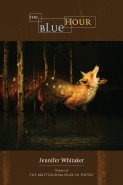
Book Review: The Blue Hour by Jennifer Whitaker

The Blue Hour
Poems by Jennifer Whitaker
University of Wisconsin Press, March 2016
ISBN-13: 978-00299308643
$14.95; 57 pp.
Reviewed by Beth Sutton-Ramspeck and Doug Ramspeck
When we think of fairy tales, we might imagine innocent and reassuring Disney stories for children. But the original oral folk tales, including those recorded by the Brothers Grimm and Giambattista Basile, were frequently dark, violent, and bleak. Indeed, their connection to children has mostly to do with the primitive and animistic sense that spirits are everywhere and in everything, and for the most part malevolent.
In The Blue Hour, winner of the Brittingham Prize in Poetry, Jennifer Whitaker presents a speaker who returns us to this primal mindset to explore the emotional ramifications of abuse at the hands of a father. These often discursive poems offer recurring themes and images, among them the appropriation of traditional fairy tales. A quick glance at the contents page yields titles that include “Rumpelstiltskin,” Snow White as Apology from My Youth,” “Cinderella as Wish That Comes True,” “Rapunzel,” and “Daughter as Pig in the House.” Though these poems are presented in ironic and often bitter retrospect, they return us to the child’s confused and fearful interruptions, which add to the emotional power of the stories.
In “Aubade,” for example, Whitaker echoes not the Disney Sleeping Beauty awakened with the “delicate brush of lips” but Basile’s “older story” in which a “man who smelled like a king” sees a “cursed girl” “still and silent / as a copse of willow, as a cool corpse in a field,” and “cops a feel.” The daughter
wants to warn the girl in the story
how she’ll really wake: alone again, all in ruin
around her, still cursed to see the hatchet
of the coming dawn strike through the dark.
Whitaker thus reverses our modern expectations of fairy tales to reinforce the brutality of a far-from-idyllic childhood, filled, as she writes in “Father as Map of the World,” with “starving beasts, with waters that drown.”
Edward Burnett Tylor surveyed animistic beliefs in his 1871 work Primitive Culture, and although we associate the animistic mindset to another place and time, to ancient tribes and cultures, our brains are still built on the same archaic structure. We don’t want to believe that the sound of a hissing snake is an augury, but the ancient mind, the child’s mind, insists otherwise. Whitaker takes us back to this world through a series of nimble, evocative, and often moving poems.

Leave a Reply